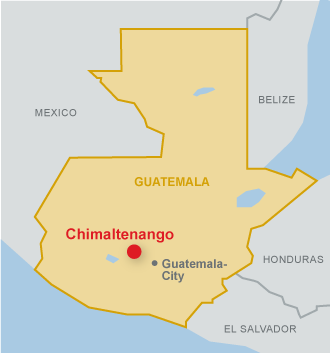
La Esperanza provides adolescents from disadvantaged backgrounds with access to an affordable secondary school offering a recognised degree. The teaching approach is strongly student-centred, fostering critical thinking and problem-solving skills. Violence prevention, mutual respect, and increasing personal responsibility are important elements of the schooling. The youths put their own initiatives into practice through events, handicrafts, or business ventures, gaining practical experience in social entrepreneurship. The equal education fund (EEF) supported the school from 2016 until mid-2024.
Background
Guatemala is the most populous country in Central America. One distinctive feature of the region is that approximately 40 percent of the population are of indigenous descent. Indigenous communities generally have lower educational attainment and less access to lucrative professions. The country continues to suffer from the lingering consequences of a civil war, with violence remaining a tragic part of daily life for many Guatemalans. Drug- and gang-related crime is widespread in urban areas, while land disputes frequently flare up in rural regions.
More than half of the population – disproportionately indigenous communities – lives in poverty, facing considerable unemployment and precarious healthcare. The situation for adolescents is particularly concerning. Government support is largely limited to primary education, resulting in very few publicly funded education opportunities after completion of primary school. As a result, adolescents from low-income backgrounds struggle to access vocational training or secondary school. Many primary school graduates are at risk of falling into drug- and gang-related crime or prostitution
Project goals
Low school fees provide adolescents from low-income backgrounds with access to a recognised secondary school degree, opening up opportunities they would otherwise struggle to attain.
A cultural, arts, and sports program, along with workshops focused on violence prevention, complements formal education. Adolescents are encouraged to become aware of their rights and responsibilities while exploring alternatives to a life marked by violence.
Special lessons for the group of leaders («Grupo de Lideres») empower its members to promote the core values of peaceful coexistence. Over time, they gradually take on more responsibility for organising and funding school operations, gaining practical experience in entrepreneurship.
Project development
In 2010, teacher Hilda Vásquez organised a reading and writing course for 15 indigenous women in her home. The participants highlighted the need for an affordable secondary school for their children. In response, Hilda Vásquez, together with fellow teachers, launched the new Community School in 2011 with its first secondary school class. The teaching team worked voluntarily, delivering lessons under a simple corrugated iron roof on rented land.
The founding board of the sponsoring organisation was composed of parents who were committed to expanding the school. Occasional donations facilitated the purchase of teaching materials, the construction of two additional classrooms and three toilets. The student body grew to over 60 young people. In 2014, the sponsoring association was registered and the Community School La Esperanza received official state recognition. The degree certificate allows students to pursue further education at higher secondary schools or enrol in vocational training programs across the country.
Beyond the cultivation of Guatemalan culture, the young people learn strategies for non-violent conflict resolution, and receive education on sex and the consequences of drug use. Additional course topics include social media awareness, bullying, and environmental protection. The weekly schedule also includes sports, handicrafts, computer classes and bookkeeping. One third of the student body makes up the group of leaders («Grupo de Lideres»), which is newly formed each year. Members receive special lessons in violence prevention and teach this learning contents in workshops at other schools. Their tasks also include developing creative ideas on how the school can generate income, which are then tested in practice.
Support from the EEF
The president of the equal education fund (EEF) first visited the La Esperanza project in 2015 and was immediately impressed by its interesting educational approach. Following a second visit in 2016, the decision was made to support the project. Thanks to this collaboration, the school was able to enhance its high-quality teaching with new elements and implement professionalisation measures in administration. La Esperanza subsequently expanded its instruction to five secondary school levels and began offering specialised diploma programs for vocational preparation.
As the school grew, the need arose to move out of the rented premises and establish a dedicated campus, providing more space and design possibilities. The EEF supported the project manager in developing the concept for a new building. Fortunately, in 2024, additional donors expressed interest in financing both the construction and ongoing operation of the school. Due to the complexity of managing this new collaboration, the project manager requested that the partnership with the EEF be concluded by mid-2024, enabling her to focus entirely on the new funding partners. We are delighted that this valuable educational initiative will continue with the support of new donors.

Gallery
_gallery_teaser.jpg?lm=1745436322)
Guatemala Community School La Esperanza Picture Gallery 2024
view album
_gallery_teaser.jpg?lm=1718134903)
Guatemala Community School La Esperanza Picture Gallery 2023
view album
_gallery_teaser.jpg?lm=1686895131)
Guatemala Community School La Esperanza Picture Gallery 2022
view album
_gallery_teaser.jpg?lm=1650524372)
Guatemala Community School La Esperanza Picture Gallery 2021
view album
_gallery_teaser.jpg?lm=1612791006)
Guatemala Community School La Esperanza Picture Gallery 2020
view album
_gallery_teaser.jpg?lm=1584610003)
Guatemala Community School La Esperanza Picture Gallery 2019
view album
_gallery_teaser.jpg?lm=1571830271)
Guatemala Community School La Esperanza Picture Gallery 2018
view album
_gallery_teaser.jpg?lm=1571829700)
Guatemala Community School La Esperanza Picture Gallery 2017
view album
_gallery_teaser.jpg?lm=1571667641)
Guatemala Community School La Esperanza Picture Gallery 2016
view album
_gallery_teaser.jpg?lm=1571667213)
Guatemala Community School La Esperanza Picture Gallery before 2016
view album
